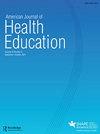Can We Make the Collegiate Personal Health Course More Relevant and Applicable?
IF 0.8
Q4 PUBLIC, ENVIRONMENTAL & OCCUPATIONAL HEALTH
引用次数: 0
Abstract
ABSTRACT Background Many institutions offer introductory personal health courses to fulfill a general requirement; however, gaps may exist regarding health education and information students receive and what they find relevant to their lives. Purpose Identification of topics of salience/relevance to college students in introductory personal health courses, including delivery improvement recommendations. Methods We interviewed students (ages 18–25) who completed an introductory personal health course. MAXQDA© was used for organizing codes and themes responsive to research questions. Results Emergent themes related to mental health, exercise, nutrition, stress, sexual health, and alcohol substance use were uncovered. Students preferred interactive learning and harm reduction approaches to passive learning. Discussion A disconnect exists between students’ interests and what is taught. Formats for presenting topics alienated students, making them feel judged if pursuing questions. The gap between the product desired and that delivered occurred across delivery platforms, syllabi, and textbooks. Translation to Health Education Practice: We heard praise for examples of active, skills-based learning. Students were eager to improve content and delivery and enumerated examples of how to make courses more relevant and applicable. Instructors may need to be better prepared in content, pedagogy, and health-based philosophy to accommodate the diverse student population at collegiate institutions. A AJHE Self-Study quiz is online for this article via the SHAPE America Online Institute (SAOI) http://portal.shapeamerica.org/trn-Webinars.我们能让大学个人健康课程更具相关性和适用性吗?
摘要背景许多机构提供个人健康入门课程以满足一般要求;然而,在健康教育和学生获得的信息以及他们发现的与生活相关的内容方面,可能存在差距。目的确定大学生在个人健康入门课程中的突出/相关主题,包括改进交付的建议。方法我们采访了完成个人健康入门课程的学生(18-25岁)。MAXQDA©用于组织响应研究问题的代码和主题。结果发现了与心理健康、运动、营养、压力、性健康和酒精物质使用有关的突发主题。与被动学习相比,学生更喜欢互动学习和减少伤害的方法。讨论学生的兴趣和所教内容之间存在脱节。呈现主题的形式疏远了学生,让他们在提问时感觉受到了评判。所需产品与交付产品之间的差距出现在交付平台、教学大纲和教科书上。健康教育实践:我们听到了对积极、基于技能的学习的赞扬。学生们渴望改进内容和交付,并列举了如何使课程更具相关性和适用性的例子。教员可能需要在内容、教学法和基于健康的哲学方面做好更好的准备,以适应大学机构中不同的学生群体。AJHE自学测验通过SHAPE美国在线研究所(SAOI)在线为本文提供http://portal.shapeamerica.org/trn-Webinars.
本文章由计算机程序翻译,如有差异,请以英文原文为准。
求助全文
约1分钟内获得全文
求助全文
来源期刊

American Journal of Health Education
PUBLIC, ENVIRONMENTAL & OCCUPATIONAL HEALTH-
CiteScore
1.70
自引率
10.00%
发文量
36
期刊介绍:
AJHE is sponsored by the American Association for Health Education of the American Alliance for Health, Physical Education, Recreation and Dance. The mission of the American Association for Health Education(AAHE) is to advance the profession by serving health educators and others who strive to promote the health of all people through education and other systematic strategies.AAHE addresses the following priorities •Develop and promulgate standards, resources and services regarding health education to professionals and non-professionals •Foster the development of national research priorities in health education and promotion. Provide mechanisms for the translation and interaction between theory, research and practice.
 求助内容:
求助内容: 应助结果提醒方式:
应助结果提醒方式:


